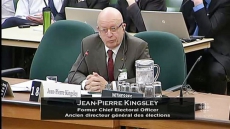GATINEAU, Que. — Canada's small Internet service providers are promising "faster speeds, better service, affordable pricing" following a decision by the country's communications regulator that will force the big telecom firms to open their fibre optic networks to competitors.
The new requirement, announced Wednesday by the Canadian Radio-television and Telecommunications Commission, will give independent ISPs access to much higher speed networks.
The move should also foster greater competition in the broadband Internet market, the CRTC said in releasing the decision.
"Large incumbent companies will now have to make their fibre facilities available to their competitors," the regulator said in a statement.
"This measure will ensure that Canadians have more choice for high-speed Internet services."
The big telecom companies, including Bell, Rogers, Telus and Shaw, have so far made fibre optic services available to about three million homes across the country.
But they have limited smaller ISPs to access of their slower networks, through cable or copper wire connections.
During hearings into Canada's wholesale wireline services conducted last fall, the big players warned that allowing competitors access to their fibre optic networks would deter investments in equipment needed to deliver better service and faster speeds to Canadian homes and businesses.
But smaller ISPs dismissed the warning, accusing the big players of shutting them out of fibre networks in order to protect their market share.

The new rules "will have a profoundly positive impact on Canadian consumers, competition, and competitors," said William Sandiford, president of the Canadian Network Operators Consortium, which represents 37 telecommunications services providers across the country.
The CRTC is also moving to a so-called disaggregated model of providing high speed access, which will require smaller ISPs to invest in equipment to access networks in different locations.
"We also are telling those competitors that they're going to have to invest in the transport infrastructure," said CRTC chairman Jean-Pierre Blais.
"Because the commission wants to encourage facilities-based competition."
Officials say those investments could actually reduce costs for independent ISPs, which currently access the larger networks through trunk locations.
The changes are to be phased in, starting in Ontario and Quebec.
There are more than 500 independent ISPs operating in Canada, under names including Distributel, Teksavvy and Primus.
Currently, the big telcos are mandated to offer competitors access to their networks on an "aggregated" basis, which gives them access through just one location in each province.
Moving to disaggregated means independent ISPs can access broadband networks locally, through multiple interfaces, and will have the option of building their own provincial networks, or paying to piggyback on other providers.
Small players can then branch out and provide other services, such as home phone services, rather than only Internet. The CRTC is predicting that will lead to more stability within the independent ISP marketplace.
One of the bigger independent ISPs, Distributel Communications, lauded the decision.
"Fibre infrastructure is essential because it accommodates the anticipated bandwidth needs of Canadian telecom consumers of the future," said company CEO Matt Stein.
"For independents to offer viable, alternative choices to Canadians, they too must have access to that telecom infrastructure."
Distributel has already branched out beyond providing Internet service, to TV, home phone and long distance services in Quebec, Ontario, Alberta and British Columbia.

The CRTC said it is also maintaining the regulation of pricing for network access, which allows the big firms to recover the cost of providing network access, and to charge a markup that has typically ranged from 30 to 40 per cent, depending on the provider.
The markup for access to fibre optic networks is expected to be determined by late next year.



